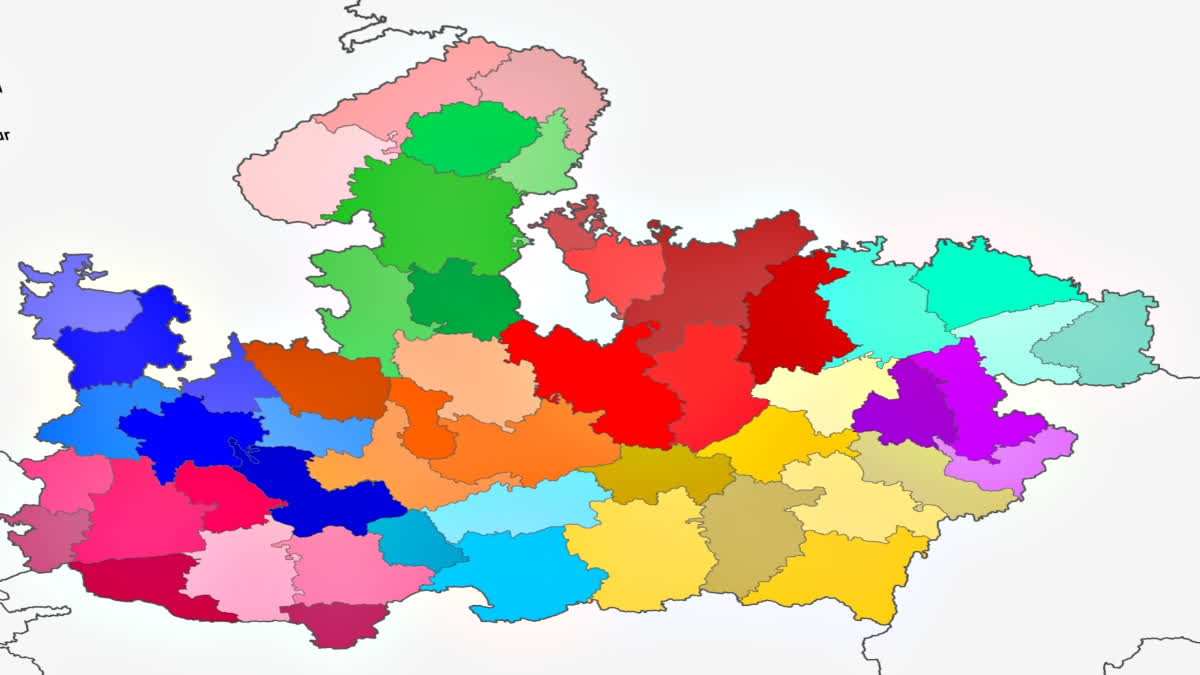Bhopal (Madhya Pradesh): As the political battleground in Madhya Pradesh heats up, the state is on the cusp of witnessing a closely contested election that could potentially redefine its political landscape. With the memories of the dramatic twists and turns of the 2018 elections still fresh, the state's 230-member assembly is gearing up for another showdown. The electoral battle in the state will take place on November 17, 2023.
The Bharatiya Janata Party (BJP) and the Indian National Congress (Congress) are locked in fierce competition, each vying to secure a majority and claim the throne of the state government. In this high-stakes political theatre, promises, policies, and strategies are taking centre stage as both parties strive to win over the hearts and votes of the people.
Madhya Pradesh, often referred to as the heart of India, is a state with a rich historical and geographical significance. This central Indian state was formed on November 1, 1956, by merging seventeen districts of Mahakoshal, two districts of Bhopal, eight districts of Vindhya Pradesh, and sixteen districts of Madhya Bharat. Initially comprising 43 districts, Madhya Pradesh underwent several administrative changes over the years.
In 1998, sixteen more districts were added to the state, expanding its territorial boundaries. The Chhattisgarh region, comprising 16 districts, was separated from Madhya Pradesh to form a new state on November 1, 2000, following the Madhya Pradesh Reorganization Act. In 2003, three additional districts - Burhanpur, Ashoknagar, and Anooppur - were established.
Madhya Pradesh currently covers a total geographical area of 308,000 square kilometres. The state is bordered by five neighbouring states: Rajasthan, Maharashtra, Gujarat, Chhattisgarh, and Uttar Pradesh. In 2001-02, the net area sown was 149.62 lakh hectares, while 14.99 lakh hectares were designated as permanent pastures, grazing lands, and miscellaneous tree crops.
With a population of 60,385,118 including 31,456,873 males and 28,928,245 females, this tribal-dominated state is considered to be one of the most underprivileged states in the country. With a Scheduled Caste population of more than 15 per cent and a Scheduled tribe nearly 20 percent, the per capita income in Madhya Pradesh stood at Rs. 11,438, at current prices, which was below the all-India per capita income of Rs. 17,978 for the same period. Madhya Pradesh continues to be classified as a low-income state, sharing this classification with states like Uttar Pradesh, Orissa, and Bihar.
The 2018 political rollercoaster:
The 2018 elections were nothing short of thrilling. Congress secured 114 seats in the 230-member assembly, just two short of an outright majority. Simultaneously, the BJP managed to secure 109 seats, showcasing a neck-and-neck battle. Notably, the BJP garnered 41% of the votes, narrowly surpassing the Congress's 40.9% vote share.
The Bahujan Samaj Party (BSP) secured two seats, with five seats going to other smaller parties and independents. This tight contest culminated in the formation of a Congress-led government with the support of BSP, Samajwadi Party (SP), and other allies.
In the 2018 Madhya Pradesh assembly elections, the Congress managed to break a 15-year dry spell by forming the government in the state. Kamal Nath assumed the role of Chief Minister. However, this government's tenure was short-lived, lasting a mere 15 months. In a dramatic turn of events, the BJP returned to power, with Shivraj Singh Chouhan taking the oath as the Chief Minister on March 23, 2020.
Key issues in 2023:
As the 2023 elections approach, both the BJP and Congress are acutely aware of the issues that will dominate the electoral discourse and sway the voters.
Addressing youth dissatisfaction and unemployment:
Youth dissatisfaction and the vexing issue of unemployment loom large on the political horizon. After the 2018 elections, recruitment processes for government jobs faced prolonged legal challenges related to reservation policies, leaving many young job-seekers disillusioned. Daily protests became the norm as unemployed individuals voiced their grievances.
However, the government has initiated efforts to quell this anger. Chief Minister Shivraj Singh Chouhan announced the ambitious goal of providing one lakh government jobs to the state's youth. This promise seeks to resonate with the sizable youth demographic and alleviate unemployment concerns.
BJP's bid for tribal and women voters:
In a bid to broaden its voter base, the BJP is strategically targeting tribal and women voters. On Tribal Pride Day, the state government implemented PESA rules, empowering Gram Sabhas to have a say in the regulations concerning natural resources in forested areas. This move aims to strengthen the party's appeal to tribal communities.
